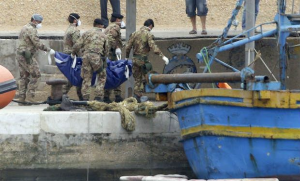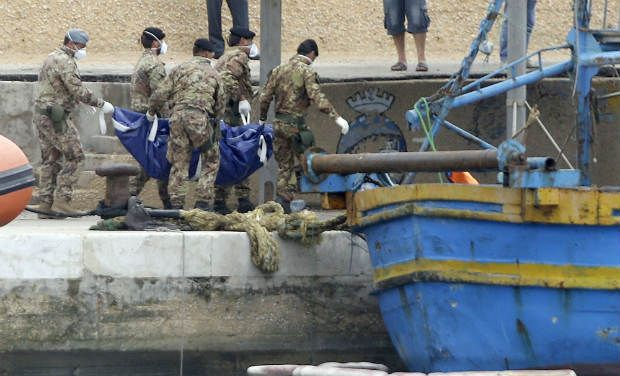 In the last one month alone, no less than 500 Africans, fleeing wars and poverty in Somalia, Eritrea, Nigeria, Sudan, Ghana, Senegal, Ethiopia and other countries drowned in the Mediterranean sea when the on the rickety boats and barely floating vessels they were sailing on caught fire, developed engine problems or simply sank in tempestuous waters.
In the last one month alone, no less than 500 Africans, fleeing wars and poverty in Somalia, Eritrea, Nigeria, Sudan, Ghana, Senegal, Ethiopia and other countries drowned in the Mediterranean sea when the on the rickety boats and barely floating vessels they were sailing on caught fire, developed engine problems or simply sank in tempestuous waters.
Some of the would-be migrants paid between one to two thousand US dollars to people smugglers to facilitate their passage into Europe by any means possible. Spain used to be a preferred location with migrants crossing over from Morocco. More recently, the Italian island of Lampedusa in the Mediterranean, as well as Malta, Cyprus, or any of the outlying islands of Greece have become popular destinations – any foothold into Europe would do.
Ironically, at the same time that these vulnerable Africans are being forced by instability to flee to Europe, at the other end of the spectrum, highly trained Africans and professionals in several fields are voluntarily seeking to relocate to Europe and North America. This group is driven not by abject poverty, but the quest to find better lives.
However, whether they are economic or political migrants, the journey across the Atlantic or Mediterranean speaks volumes about Africa’s supposed economic growth and improving political climate. It also reveals huge ignorance about the economic condition of Europe and other would-be destinations.
Why would already impoverished people mortgage so much to send a son or daughter across the Sahara and into Europe on the less than faint hope of their getting a job and sending money back home? What is the attraction of Europe? Even for skilled professionals, are jobs readily available? How many Africans stand the chance of gaining legal residency status in Europe and actually finding a job? And in the unlikely event that they obtain legal status and really find jobs, would anything be left to live on, much less send back home?
One disturbing aspect is that many more Africans drown each month than is actually reported; some boats simply vanish into the deep waters with their cargoes of would-be migrants. It is only when large numbers of people die – and even then, only when it is reported in the media that the rest of the world pause to reflect on the fact that the Mediterranean has more African bodies floating on it than we care to admit.
If a few more would-be migrants viewed the larger picture, they would probably think twice about embarking on the dangerous and increasingly suicidal mission across the Mediterranean. The economic circumstance of Europe has changed so significantly in the last decade or so that Europeans are actually coming to Africa in search of jobs, with Angola and Mozambique being favourite destinations for Portuguese youth. Even within Europe, vast numbers of young people are moving from the South, where Africans usually land, to Germany and other northern European countries in search of jobs.
The spectacle of healthy young Africans crossing oceans to work in other lands is evocative of the trans-Atlantic slave trade, albeit with a sense of paradox: In the old slave trade, Africans were forcefully taken from their homes and sent across the Atlantic to the Americas to work on sugar and cotton plantations where they remained slaves for life. Today, Africans actually pay money they can ill-afford to be ferried across the Mediterranean into a life of what would amount to a little more than slavery – beginning at the detention camps where they often spend years.
While the focus of migration from Africa might be on the unskilled and unwashed masses fleeing wars and conflict, an even more costly loss (at least from the African perspective) is taking place: The trained personnel required to help keep hopes of African development alive are on their way to different parts of the world. Doctors, pharmacists, lawyers, scientists, university professors, nurses, dentists, IT specialists and even sports professionals are moving out. This time, it is neither the crack of whips nor the clang of chains that compels them to move to foreign lands, but the dream of a better life.
However, whether it is sorrow or hope on the faces of Africans leaving for other lands, the consequences on the continents remains the same: loss of capacity. The speed of African development is being held down by the vast movement of the continent’s best trained professionals. For example, estimates suggest that there are about 200, 000 Nigerian medical professionals and pharmacists in the US alone, in addition to about 50, 000 engineers and IT experts, and tens of thousands of legal, financial, real estate and other professionals.
Undoubtedly, some Africans have genuine reasons for fleeing to other lands in search of better lives and livelihoods, and some of them have achieved enviable successes. Unfortunately, for majority of would-be immigrants, the truth is that whether they choose the Atlantic or Mediterranean, they very often end up in watery graves – literally or figuratively.


